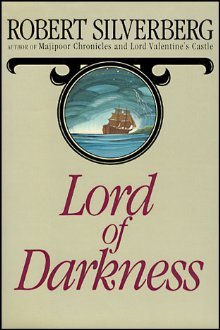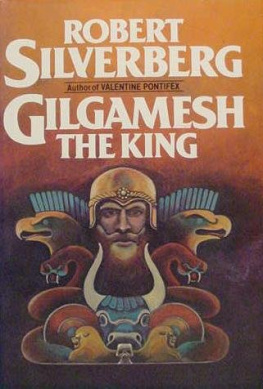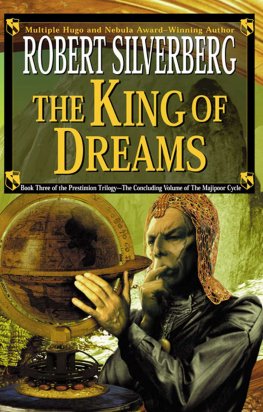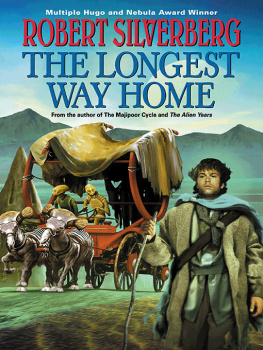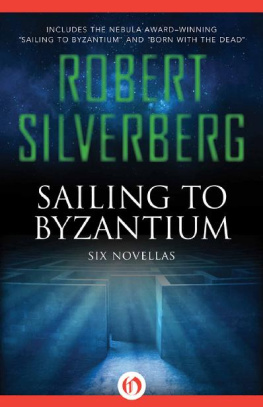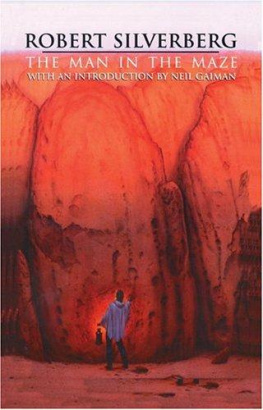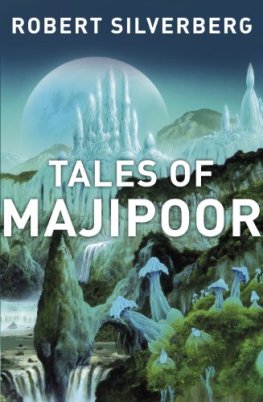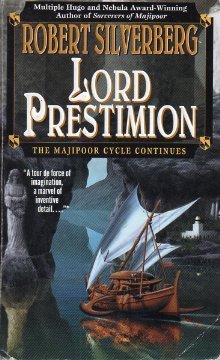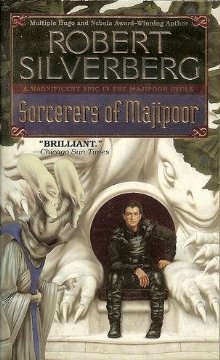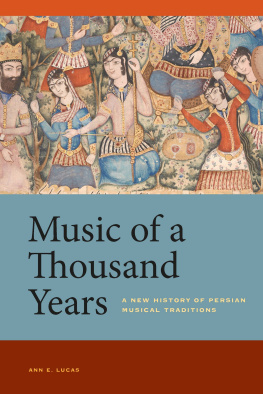The Book of Changes
by Robert Silverberg
Standing at the narrow window of his bedchamber early on the morning of the second day of his new life as a captive, looking out at the blood-red waters of the Sea of Barbirike far below, Aithin Furvain heard the bolt that sealed his apartment from the outside being thrown back. He glanced quickly around and saw the lithe catlike form of his captor, the bandit chief Kasinibon, come sidling in. Furvain turned toward the window again.
As I was saying last night, it truly is a beautiful view, isnt it? Kasinibon said. Theres nothing like that scarlet lake anywhere else in all Majipoor.
Lovely, yes, said Furvain, in a remote, affectless way.
With the same relentless good cheer Kasinibon went on, addressing himself to Furvains back, I do hope you slept well, and that in general youre finding your lodgings here comfortable, Prince Aithin.
Out of some vestigial sense of courtesy courtesy, even to a bandit! Furvain turned to face the other man. I dont ordinarily use my title, he said, stiffly, coolly.
Of course. Neither do I, as a matter of fact. I come from a long line of east-country nobility, you know.
Minor nobility, perhaps, yet nobility nevertheless. But they are such archaic things, titles! Kasinibon grinned. It was a sly grin, almost conspiratorial, a mingling of mockery and charm. Despite everything Furvain found it impossible to dislike the man. You havent answered my question, though. Are you comfortable here, Furvain?
Oh, yes. Quite. Its absolutely the most elegant of prisons.
I do wish to point out that this is not actually a prison but merely a private residence.
I suppose. Even so, Im a prisoner here, is that not true?
I concede the point. You are indeed a prisoner, for the time being. My prisoner.
Thank you, said Furvain. I appreciate your straightforwardness. He returned his attention to Barbirike Sea, which stretched, long and slender as a spear, for fifty miles or so through the valley below the gray cliff on which Kasinibons fortresslike retreat was perched. Long rows of tall sharp-tipped crescent dunes, soft as clouds from this distance, bordered its shores. They too were red. Even the air here had a red reflected shimmer. The sun itself seemed to have taken on a tinge of it. Kasinibon had explained yesterday, though Furvain had not been particularly interested in hearing it at the time, that the Sea of Barbirike was home to untold billions of tiny crustaceans whose fragile bright-colored shells, decomposing over the millennia, had imparted that bloody hue to the seas waters and given rise also to the red sands of the adjacent dunes. Furvain wondered whether his royal father, who had such an obsessive interest in intense color effects, had ever made the journey out here to see this place. Surely he had. Surely.
Kasinibon said, Ive brought you some pens and a supply of paper. He laid them neatly out on the little table beside Furvains bed. As I said earlier, this view is bound to inspire poetry in you, that I know.
No doubt it will, said Furvain, still speaking in that same distant, uninflected tone.
Shall we take a closer look at the lake this afternoon, you and I?
So you dont intend to keep me penned up all the time in these three rooms?
Of course I dont. Why would I be so cruel?
Well, then. Ill be pleased to be taken on a tour of the lake, Furvain said, as indifferently as before. Its beauty may indeed stir a poem or two in me.
Kasinibon gave the stack of paper an amiable tap. You also may wish to use these sheets to begin drafting your ransom request.
Furvain narrowed his eyes. Tomorrow, perhaps, for that. Or the day after.
As you wish. Theres no hurry, you know. You are my guest here for as long as you care to stay.
Your prisoner, actually.
That too, Kasinibon said. My guest, but also my prisoner, though I hope you will see yourself rather more as guest than prisoner. You will excuse me now. I have my dreary administrative duties to deal with. Until this afternoon, then. And grinned once more, and bowed and took his leave.
Furvain was the fifth son of the former Coronal Lord Sangamor, whose best-known achievement had been the construction of the remarkable tunnels on Castle Mount that bore his name. Lord Sangamor was a man of a strong artistic bent, and the tunnels, whose walls were fashioned from a kind of artificial stone that blazed with inherent radiant color, were considered by connoisseurs to be a supreme work of art. Furvain had inherited his fathers aestheticism but very little of his strength of character: in the eyes of many at the Mount he was nothing more than a wastrel, an idler, even a rogue. His own friends, and he had many of them, were hard pressed to find any great degree of significant merit in him. He was an unusually skillful writer of light verse, yes; and a genial companion on a journey or in a tavern, yes; and a clever hand with a quip or a riddle or a paradox, yes; and otherwise- otherwise-
A Coronals son has no significant future in the administration of Majipoor, by ancient constitutional tradition. No function is set aside for him. He can never rise to the throne himself, for the crown is always adoptive, never hereditary. The Coronals eldest son would usually establish himself on a fine estate in one of the Fifty Cities of the Mount and live the good life of a provincial duke. A second son, or even a third, might remain at the Castle and became a councilor of the realm, if he showed any aptitude for the intricacies of government. But a fifth son, born late in his fathers reign and thereby shouldered out of the inner circle by all those who had arrived before him, would usually face no better destiny than a drifting existence of irresponsible pleasure and ease. There is no role in public life for him to play. He is his fathers son, but he is nothing at all in his own right. No one is likely to think of him as qualified for any kind of serious duties, nor even to have any interest in such things. Such princes are entitled by birth to a permanent suite of rooms at the Castle and a generous and irrevocable pension, and it is assumed of them that they will contentedly devote themselves to idle amusements until the end of their days.
Furvain, unlike some princes of a more restless nature, had adapted very well to that prospect. Since no one expected very much of him, he demanded very little of himself. Nature had favored him with good looks: he was tall and slender, a graceful, elegant man with wavy golden hair and finely chiseled features.
He was an admirable dancer, sang quite well in a clear, light tenor voice, excelled at most sports that did not require brute physical force, and was a capable hand at swordsmanship and chariot racing. But above all else he excelled at the making of verse. Poetry flowed from him in torrents, as rain falls from the sky. At any moment of the day or night, whether he had just been awakened after a long evening of drunken carousing or was in the midst of that carousing itself, he could take pen in hand and compose, almost extemporaneously, a ballad or a sonnet or a villanelle or a jolly rhyming epigram, or quick thumping short-legged doggerel, or even a long skein of heroic couplets, on any sort of theme. There was no profundity to such hastily dashed-off stuff, of course. It was not in his nature to probe the depths of the human soul, let alone to want to set out his findings in the form of poetry. But everyone knew that Aithin Furvain had no master when it came to the making of easy, playful verse, minor verse that celebrated the joys of the moment, the pleasures of the bed or of the bottle, verse that poked fun without ever edging into sour malicious satire, or that demonstrated a quick verbal interplay of rhythm and sound without actually being about anything at all.


